
Ancyra is a small genus of planthoppers of the family Eurybrachidae and the only genus in the tribe Ancyrini. Species in this genus occur in southeast Asia.

Fulgora laternaria is a species of Neotropical fulgorid planthopper. It is known by a large variety of common names, among them lantern fly, peanut bug, peanut-headed lanternfly, alligator bug, jequitiranaboia, machaca, chicharra-machacuy, and cocoposa.

The family Fulgoridae is a large group of hemipteran insects, especially abundant and diverse in the tropics, containing over 125 genera worldwide. They are mostly of moderate to large size, many with a superficial resemblance to Lepidoptera due to their brilliant and varied coloration. Various genera and species are sometimes referred to as lanternflies or lanthorn flies, but neither do their heads emit light, nor are they even distantly related to flies.

Eurybrachidae is a small family of planthoppers with species occurring in parts of Asia, Australia and Africa. They are remarkable for the sophistication of their automimicry.

Pyrops candelaria is a species of planthopper often placed in the tribe Laternariini. This species has been recorded from: Guangdong, Guangxi, Cambodia, Vietnam, Hong Kong, Laos, Thailand and other parts of southeast Asia. It is the type of the genus Pyrops erected by Spinola in 1839.

Pyrops is a genus of planthoppers that occur primarily in southeast Asia, containing about 70 species. They are fairly large insects, with much of the length due to an elongated, upcurving, snout-like projection of the head. The wings are generally brightly patterned in contrasting colors, and they are popular among collectors.
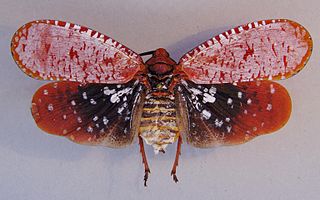
The subfamily Aphaeninae is a group of hemipteran insects, especially abundant and diverse in the tropics, in the family Fulgoridae, or "lanternflies".

Chrysolina is a large genus of leaf beetles in the subfamily Chrysomelinae. Most species are distributed in Europe, Asia and Africa with a small number of species inhabiting North America and introduced species in Australia.
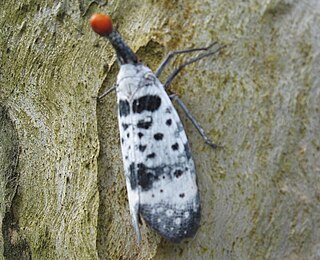
Pyrops clavatus is a species of true bug in the family Fulgoridae, in the genus Pyrops which are sometimes called "lanternflies". This species is found in parts of northern and northeastern India, Myanmar, northern Thailand, southern China and northern Vietnam. The tip of the elongated head capsule is spheroidal, shiny and chestnut in colour while the remainder of the process is black with fine white spotting. The forewing has a variable patterning of black, grey and white. The hindwing is purplish white with the apical half black. Specimens have been obtained along the Himalayas west to Mussoorie but more often in Assam, Sikkim, Shillong and the Khasi Hills.

Bythopsyrna is a genus of Asian planthoppers belonging to the family Flatidae.

Calyptoproctus is a genus of planthoppers in the family Fulgoridae; records are from Central and South America.
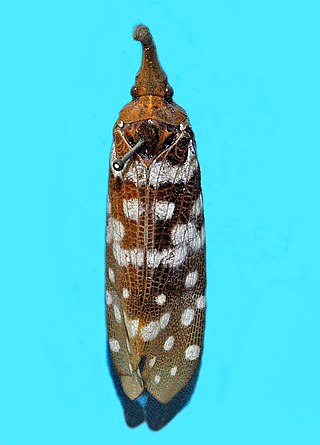
Pyrops maculatus is a species of planthopper belonging to the family Fulgoridae. A population is found in Sri Lanka while another is known from southwestern India.

The Fulgorinae are a sub-family of insects in the Auchenorrhyncha: which include the spectacular "lantern-bugs" and allied insects.
Saiva cardinalis is a species of lantern bug in the genus Saiva, found to the North-East of India, Nepal and Vietnam.
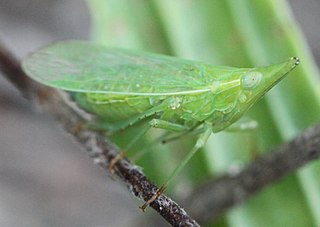
Dictyophara europaea, is the type species of planthoppers belonging to the subgenus Dictyophara (Dictyophara): in the family Dictyopharidae, and tribe Dictyopharini.
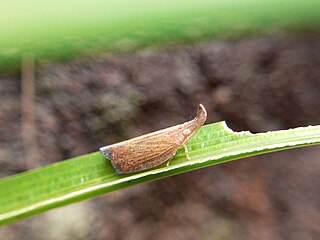
Pyrilla is a genus of bugs in the subfamily Lophopinae and tribe Lophopini.

Eurybrachys is a genus of bugs in the family Eurybrachidae. First formally named in 1834 by French entomologist Félix Édouard Guérin-Méneville, Eurybrachys is the type genus of the family Eurybrachidae. The spelling Eurybrachis, by the author, is considered an unaccepted orthographic variant. Species in this genus occur in Asia.
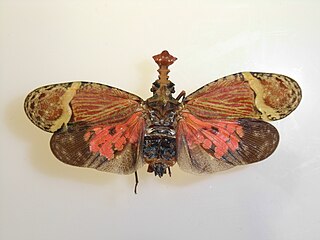
Phrictus is a genus of bugs in the subfamily Fulgorinae and tribe Fulgorini, erected by Maximilian Spinola in 1839. They are sometimes called "dragon-headed bugs" and species have been recorded from central and South America.

Diareusa is a genus of bugs in the subfamily Fulgorinae and tribe Fulgorini, erected by Francis Walker in 1839. Species have been recorded from central and South America.




















